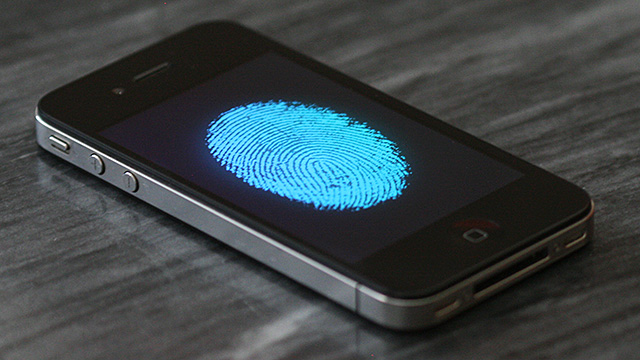
Apple may be planning to add 2D fingerprint sensors to a future version of the iPhone, according to details revealed in a recent Securities & Exchange Commission filing. The PREM14A document (hat tip to TNW) was filed as a result of Apple's buyout of security chip firm AuthenTec, and it reveals more details about the agreement between the two companies, as well as hints about Apple's future engineering plans.
The SEC document reveals that Apple had been after biometric security company AuthenTec's unspecified "new technology" for almost a year ("late 2011") before it decided to go ahead and buy the company in July. At the time, AuthenTec had been approaching a number of consumer electronics companies—Apple included—to try to sell licenses for its unspecified technology. Apple was apparently the only company to try to move forward with an agreement—cost seemingly deterred others—but negotiations ended up falling apart in early 2012. That's when Apple began entertaining the idea of a buyout, offering AuthenTec $7 per share, for a total of $356 million.
According to the document, Apple tried to woo AuthenTec by arguing that its offer would allow the company to develop technology for just one platform instead of many.
"At the meeting, a representative of Apple noted Apple’s view that $7.00 per share represented a price that other potential buyers would be unwilling to pay," AuthenTec wrote in the SEC filing. "The representatives of Apple also stated that the Company should view the price as very attractive in light of the Company’s growth prospects, noting specifically the challenges that the Company would face in profitably developing the new technology for other large consumer electronics manufacturers, which have dozens of different smartphone platforms, in contrast to Apple’s unique narrow product platform, which allows for unity of design in component parts across significant unit volumes."
Though the filing doesn't offer exact details on why Apple wanted to buy AuthenTec, it does state that Apple obtained rights to use AuthenTec's patents and license them out to others. In particular, AuthenTec says Apple has the rights to patents relating to "hardware technology, software technology, and patents of the Company for commercialization of 2D fingerprint sensors for use in or with Apple products. "
Indeed, one of AuthenTec's most well-known technologies is the fingerprint scanner already used by a number of other companies, such as Samsung, Motorola, Nokia, HP, LG, and others. For example, one popular Android device, the Motorola Atrix, has an AuthenTec fingerprint scanner built into the back—users can swipe their fingers across it to unlock the device instead of using a PIN or passcode.
Apple may want to begin offering that in order to make its new iOS 6 feature, Passbook, more secure, in addition to beefing up overall iOS security. (And let's just say that a certain Senior Apple Editor wouldn't argue with such a thing coming to the iPhone, either—ever since seeing the fingerprint scanner on the Atrix in action, I've wanted something similar on my phone.)
But, as TNW points out, AuthenTec also makes a smart sensor to work with NFC (Near Field Communications). Apple has been rumored to be adding NFC capabilities to its next-gen iPhone and iPad since early 2011, but it has not yet appeared. Some expect it to arrive along with the so-called "iPhone 5" that may be introduced next month, though there haven't been many recent rumors to that effect. A number of Android devices are beginning to adopt NFC technology, so it's possible that Apple won't be too far behind with its own implementation.
There's a hint that, whatever the tech involved, we won't have long to wait. According to AuthenTec's account, Apple wanted to hurry the buyout deal due to its own plans. "Representatives of Apple also noted Apple’s desire to proceed quickly due to its product plans and ongoing engineering efforts," reads the SEC filing. "As a result of its focus on timing, Apple’s representatives also informed the Company that Apple would not participate in an auction process and would rescind its proposal if the board decided to solicit alternative acquisition proposals for the Company."
reader comments
39